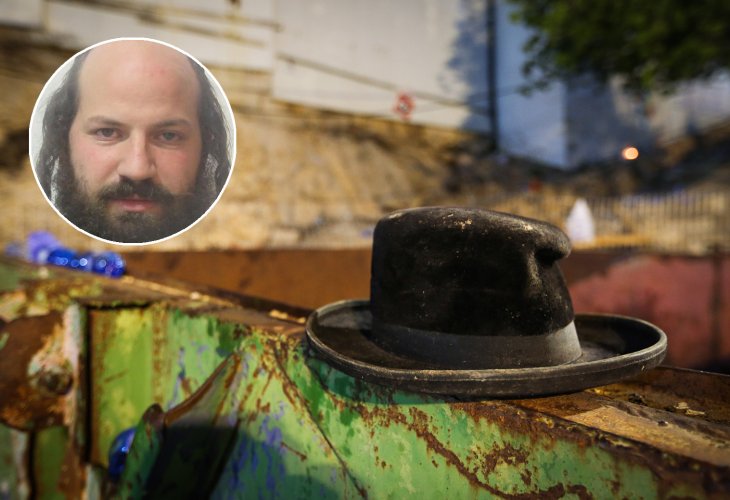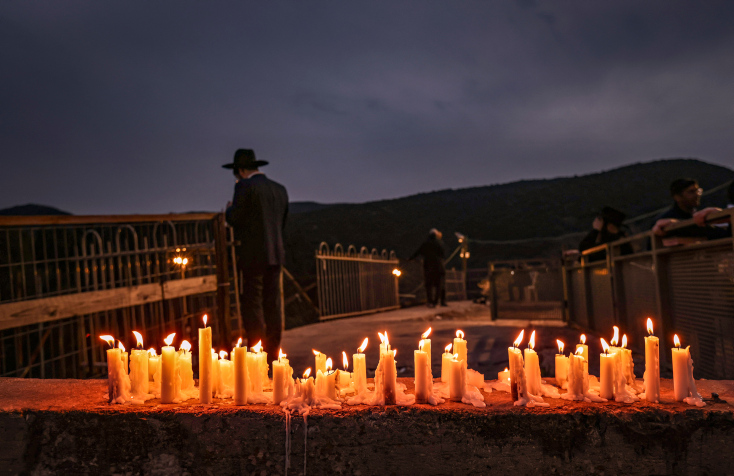Widow of Meron Victim Shares: "Just Before Yehuda Left for Meron, He Told Me 'Be Happy!'"
Nehami Rubin, a singer and creator, shares the difficult times since the passing of her husband Yehuda. What helps her find strength to cope? And what did a great person say when she asked him how to raise the children now?
 In the circle: Yehuda Rubin (Background photo: Flash 90)
In the circle: Yehuda Rubin (Background photo: Flash 90)A year has passed since the tragic Meron disaster, which claimed the lives of 45 people. The tragedy affected so many families, leaving them grieving and bereaved. Yehuda Leib Rubin was then a month past his 27th birthday. A week before the tragedy, he asked his wife Nehami what she thought about him going to Meron. "Go and bring miracles," she replied, as only Hashem knows which. Since then, the longing and pain remain, and in brief words, containing so much, Nehami expresses her feelings.
A year passed too quickly, and it didn’t help that it was a leap year.
I want to preserve it, not let it pass. To feel him still here, to feel it's fresh,
to still be a bit in denial, so it doesn't hurt too much.
But now and then the abscess of pain shows its signs,
and the weakness, the helplessness embrace me, as if I'm inside a fog cloud...
I try to tell myself it's a cloud of glory, so let go. Trust in the Creator of the world,
who created the world for you, gave you your husband for you, and also took him for you.
I remember how before he left, he told me: Be happy!
It is written that on this day one eats, drinks, and rejoices. And that is what you'll do!
So how will I face the broken heart and his last will?
It's a day that will challenge me to find a bridge between them...
Reminds me of the verse "Rejoice with trembling..."
It was so fitting for Yehuda to pass away on such a day,
where there will be an option for joy and dancing, so it wouldn't hurt too much.
Yehuda Leib, beloved by Hashem and man, blazing like a fiery bonfire, will never extinguish.
In your passing, I learned that smiles, love, and light cannot die.
(Nehami)
"That's it, our time is up"
"Yehuda was a G-d-fearing Jew, a wonderful husband and father," Nehami begins the interview. "An optimistic man, with an eternal smile, immense strength, and a huge heart. He loved studying Torah and loved Hashem and His world. Throughout the day, he studied in the kollel and taught students at the yeshiva." The celebration in Meron was very important to him. "When I told him on Thursday morning that I didn't feel like he should go and asked again if he wanted to go, he answered with shining eyes 'yes'. Then he continued to say: 'Do you know what Rabbi Shimon is? Do you know what a great day it is? It is written that on this day you eat, dance, and rejoice'."
After knowing about the disaster, Nehami went through nerve-wracking hours. "I called him. At first, the phone was available but he didn't answer. Yehuda was very responsible, it was always important to him that I be calm, and the fact that he didn't answer worried me. I continued preparing food for Shabbat, and in my heart, I hoped he would already come. Those were difficult hours, I couldn't fall asleep. The whole family mobilized, each searching for him in different places. Late in the morning, my mother entered the house and said 'Hashem gives and Hashem takes'."
 (Photo: David Cohen / Flash 90)
(Photo: David Cohen / Flash 90)Since then, Nehami has known many difficult moments. "I remember that moment, standing in front of him in the Shamgar funeral home, wrapped in a tallit. I felt as if he was telling me 'That's it, our time is up'. Then came the nights, where my two-year-old son wouldn't fall asleep and said 'I miss Dad'. Now he doesn't say it anymore."
Understanding that her three children, only six, four, and two years old, had suddenly become orphans was difficult. "I was always calm knowing the children had Yehuda, because he gave them confidence, strength, and love. And suddenly it was so missing," she recalls with pain. "Later I asked a righteous rabbi what would happen with their upbringing, and he answered me 'today everyone needs divine help with their children. What is required of you is to love and accept them'. Those words accompany me."
Along with the pain, Nehami also sees points of light. "There are many moments of nachat from the children, and various joyful insights of theirs. For Yehuda's birthday, for example, my son suggested putting peckelach (candy bags) on the grave for everyone who would come there, but when I explained to them that for the soul it is best to do spiritual things, he changed the plan and told me 'I will say kaddish five times'. He understood that this is now the way to make his father proud."
Naturally, sometimes thoughts of "if only I had told him not to go" arise. Did it happen to you?
"No, and one could say it is perhaps even because of Yehuda. That was his talk in life - we do our part, and we have no control over the outcomes, they are in Hashem's hands. I was fortunate to have him as a gift for seven years, and I am not angry at Hashem for taking him. It doesn't mean I didn't ask questions, or occasionally wish to understand more."
What gives you the strength to continue?
"Faith - faith in goodness, and faith in Hashem who loves me. There is a purpose and goal to everything I am going through. Also, prayer, talking to Hashem, Rabbi Nachman says that this speech builds vessels, and I need many vessels now to cope. In addition, the commitment to take care of the children and be there for them holds me. And also - to do what is good for me, and what makes me feel good. Beyond that - sometimes I also lack strength. So I learn to let go where there is no need to hold, and hold where needed not to fall."
"Song is a beautiful scream"
Even before, Nehami wrote songs and performed in front of women. "I always told Yehuda I wanted to perform without a specific story, but from faith that everyone has their life story. I never dreamed the moment would come when women would ask me to tell my story, and there would be so much to say," she says. "Singing and music are tools of expression and healing, and in the void that was created, it fills me and gives me satisfaction. Someone once told me that singing is a beautiful scream, and when there is a need to scream and unload, it gives strength."
I'm a world waiting for peace
Between the sky and the abyss
Between reality and dream
I'm a world, waiting for peace
Between the existent and the vanished
I'm a world and just a human.
I'm a world and you, the creator
Everything happens by your word
The wheel rises and falls
Keep me forever.
I'm a world and you give life
He was, is, and will be
Waiting for the day "the wolf dwells with the lamb"
For peace and tranquility of the spirit.
I'm a world waiting for peace
Between my weakness and strength
Between my heart and brain...
Nehami wrote this song several years ago, and with the current reality, it takes on additional meaning. "I have faith and I have fear, I have weakness and I have strength, and it's a challenge to find the point of peace, and to wait for it, despite everything," she explains.
What legacy do you feel Yehuda left for you?
"To be happy, to be present at this moment, not to be afraid. To do what I'm meant to do without unnecessary calculations, with humility, a good eye, and faith in myself and the Creator of the world. Along with the longing, sorrow, and mourning that still exist, when I look at my future, I seek ways to lead it to joy, happiness, strength, and all the good in the world."

